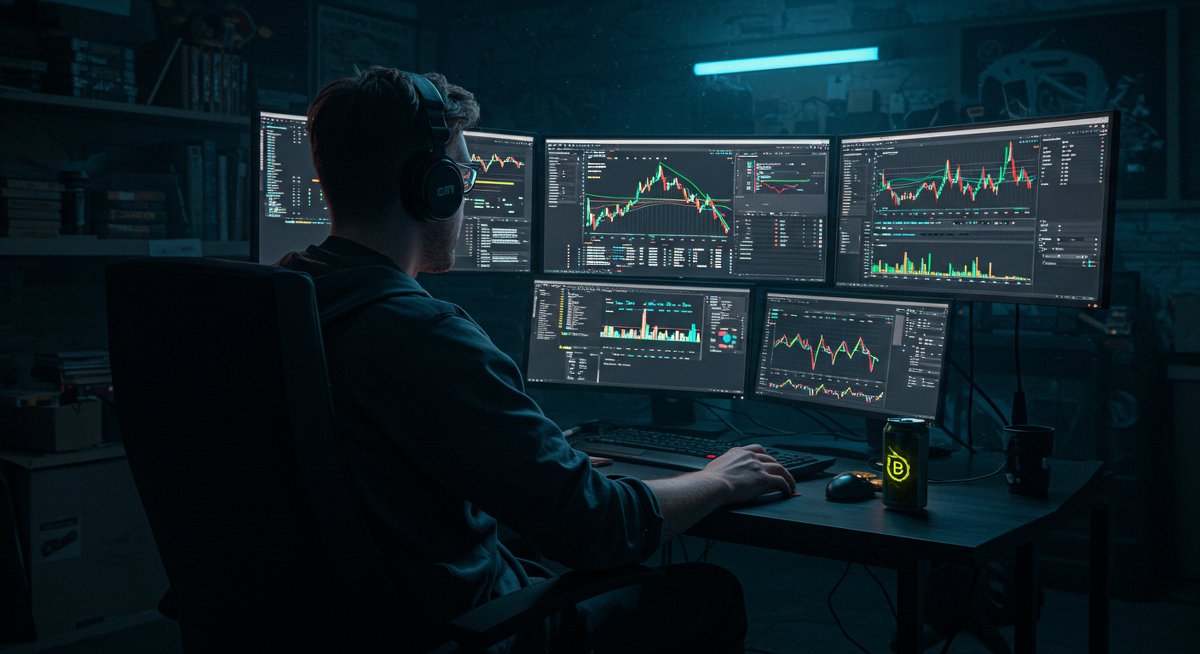That Reddit Post That Got Me Thinking About Bitcoin's Future
So, I was scrolling through r/btc the other day and saw a post that really made me stop and think. Someone brought up Max Keiser's warnings about government seizures and then questioned whether all the celebrating around institutional Bitcoin adoption is maybe a bit premature – or even misguided. It's a question that's been nagging at me too, and I think it's worth digging into, especially for those of us trading crypto from outside the US where the landscape can look very different.
The core of the issue is this: Bitcoin was supposed to be a way out of the traditional financial system, a decentralized alternative free from the control of banks and governments. But now, we're seeing massive institutions like BlackRock gobbling up huge chunks of Bitcoin, often through ETFs. Are we handing over the reins to the very players we were trying to escape? Are we so blinded by the prospect of “number go up” that we've forgotten the original ideals?
It's easy to get caught up in the excitement of rising prices and mainstream acceptance. But this Reddit post highlighted a crucial point: if most people are buying Bitcoin through these institutions, and not holding their own keys, is Bitcoin really achieving its goal of decentralization? It feels like the institutions haven't joined the Bitcoin revolution. We've joined their system instead. They’re not necessarily embracing Bitcoin’s core values; they’re making Bitcoin fit their existing model. And that has huge implications for everyone involved, particularly international traders navigating different regulatory environments. This isn't just about price; it's about the fundamental principles that underpin the entire crypto movement.

Breaking Down the Centralization Problem: It's Not Just Mining Anymore
The original Reddit post correctly points out that Bitcoin's centralization isn't just a mining issue anymore. We've largely missed the boat on truly decentralized mining, and now we're facing a similar challenge with supply. When a few massive institutions control a significant percentage of the total Bitcoin supply, they wield considerable power. They can influence the market, potentially manipulate prices, and even exert pressure on the network itself.
Think about it this way: if BlackRock or another giant decides to sell off a large portion of their Bitcoin holdings, it could trigger a massive market crash. Regular traders, especially those with smaller portfolios, would be disproportionately affected. This kind of concentrated power undermines the very idea of a decentralized, permissionless system.
The problem is amplified by the fact that many people buying Bitcoin through institutional channels don't even realize they're not holding their own keys. They're trusting these institutions to act in their best interests, which isn't always a safe assumption. These institutions are, first and foremost, driven by profit. Their priorities may not align with the long-term health and decentralization of the Bitcoin network. While some argue that institutional involvement brings legitimacy and stability, it also introduces a new set of risks. These risks are often obscured by the hype surrounding adoption and rising prices, making it crucial to take a step back and critically assess the situation. We need to be asking tougher questions about who truly controls Bitcoin and what that means for its future.
What This Means for Your Crypto Trading Strategy: Self-Custody Is Key
So, what does all this mean for you, the average crypto trader trying to navigate this increasingly complex landscape? The most important takeaway is this: self-custody is more critical than ever. If you're serious about Bitcoin and its original vision, you need to take control of your own keys. Don't rely on institutions to hold your Bitcoin for you.
This doesn't mean you have to become a technical expert overnight. There are plenty of user-friendly wallets and resources available to help you get started with self-custody. The key is to understand the risks involved in trusting third parties and to take proactive steps to protect your own assets. For example, consider using a hardware wallet, which stores your private keys offline and makes it much harder for hackers to access them. Another strategy is to diversify your holdings across multiple wallets and exchanges to minimize your exposure to any single point of failure.
Moreover, be wary of the hype surrounding institutional adoption. While it's true that institutional investment can drive up prices, it's also important to remember that these institutions are not always your friends. They may have different agendas, and their actions can have unintended consequences for the broader market. By understanding these risks and taking steps to protect yourself, you can navigate the evolving crypto landscape with greater confidence and resilience.
The Stuff Nobody Talks About: The Risks of Blindly Trusting Institutions
Let's be real. Nobody wants to be the Debbie Downer at the party, especially when Bitcoin's price is surging. But it's crucial to talk about the potential downsides of institutional dominance, the risks that often get swept under the rug in the rush to celebrate "adoption." I'm not trying to spread fear, uncertainty, and doubt (FUD), but pretending these risks don't exist is even more dangerous.
One of the biggest risks is regulatory capture. As institutions become more involved in the Bitcoin market, they'll inevitably lobby governments and regulators to create rules that benefit them. This could lead to regulations that stifle innovation, restrict access for smaller players, and ultimately undermine the decentralized nature of Bitcoin. Think about it: if a few powerful institutions can influence the rules of the game, they can effectively create a walled garden that benefits them at the expense of everyone else.
Another concern is the potential for manipulation. Institutions have access to vast amounts of capital and sophisticated trading tools. This gives them the ability to manipulate prices, front-run retail investors, and engage in other practices that are detrimental to the market. While regulations are supposed to prevent these kinds of activities, enforcement is often weak, and institutions can often find loopholes or ways to skirt the rules. The bottom line is this: blindly trusting institutions to act in your best interests is a recipe for disaster. You need to be aware of the risks, do your own research, and make informed decisions about how you participate in the Bitcoin market.
If You're Trading from Outside the US: Navigating a Patchwork of Regulations
Now, if you're trading crypto from outside the United States, things get even more complicated. The regulatory landscape varies wildly from country to country, and what's legal in one jurisdiction may be illegal in another. This patchwork of regulations creates a lot of uncertainty and can make it difficult to navigate the market safely.
In some countries, Bitcoin is treated as property and subject to capital gains taxes. In others, it's considered a currency and subject to different tax rules. Some countries have embraced Bitcoin and created clear regulatory frameworks, while others remain hostile and actively try to suppress it. For example, some nations have strict KYC (Know Your Customer) and AML (Anti-Money Laundering) regulations that require exchanges to collect detailed information about their users. This can make it difficult to maintain privacy and anonymity while trading crypto.
The key is to do your research and understand the regulations in your own country. Don't assume that what you hear online applies to you. Consult with a local tax advisor or legal professional to ensure you're complying with all applicable laws and regulations. Ignoring these rules can lead to hefty fines, legal penalties, and even imprisonment. So, take the time to educate yourself and protect your assets.

Actually Doing This Stuff: A Practical Guide to Taking Control
Okay, so you're convinced that self-custody is important and that you need to be aware of the risks of institutional dominance. But how do you actually put this into practice? Here's a step-by-step guide to taking control of your Bitcoin and navigating the evolving crypto landscape.
First, choose a reputable wallet. There are many different types of wallets available, each with its own pros and cons. Hardware wallets are generally considered the most secure option, as they store your private keys offline. Software wallets are more convenient but less secure, as they're stored on your computer or mobile device. Exchange wallets are the least secure option, as they're controlled by a third party. Some good options for beginners include Changelly due to their user-friendly interface. More experienced traders might prefer KuCoin, as it offers advanced trading features.
Second, learn how to properly secure your wallet. This includes creating a strong password, enabling two-factor authentication, and backing up your seed phrase. Your seed phrase is a set of 12 or 24 words that can be used to recover your wallet if you lose access to it. Store your seed phrase in a safe place, such as a fireproof safe or a bank vault. Don't store it on your computer or mobile device, as it could be compromised by hackers.
Third, stay informed about the latest news and developments in the crypto world. Follow reputable news sources, attend industry events, and engage with the crypto community online. The more you know, the better equipped you'll be to make informed decisions about your investments.
My Take on All This: Stay Vigilant, Stay Decentralized
So, where do I stand on all this? Am I a complete doomer who thinks Bitcoin is doomed to be taken over by institutions? Not necessarily. I think Bitcoin has the potential to coexist with traditional finance, but only if we remain vigilant and committed to its original principles.
We need to actively promote self-custody, educate newcomers about the risks of trusting third parties, and advocate for regulations that protect decentralization. We need to support projects that are working to make Bitcoin more accessible and user-friendly, without sacrificing its core values. And we need to hold institutions accountable for their actions and ensure they're not undermining the network for their own gain.
Maybe I'm being overly optimistic, but I believe Bitcoin can still fulfill its promise of creating a more decentralized and equitable financial system. But it's going to take work, and it's going to require us to resist the siren song of easy adoption and short-term profits. The future of Bitcoin is in our hands. Let's not let it slip away.